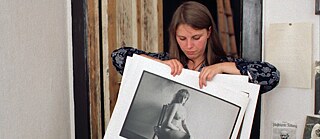|
4:30 PM
Short Films: History with a Human Face
Film + Introduction
-
ICA, London
- Part of series: Portraits from an Other Germany

Portraits from an Other Germany Programme 2
Photographs and their ability to convey meaning appear time and time again throughout Helke Misselwitz’s work. Through photography, she is able to explore intimate, personal experiences, alongside broader social and political events, investigating how these big and small histories are interlinked. Featuring three of Misselwitz’s shorts, alongside a film from West German filmmaker Jutta Brückner, this programme explores how history can be told through the lives of individuals, and indeed, how our lives can be understood through fragmented images.
With an introduction by Helke Misselwitz via Zoom.
Marx Family (1983)
Against the backdrop of a house in ruins, we see historical photographs and drawings of Karl Marx and his family and hear excerpts from personal letters written during their time in London in the 1850s. Originally titled ‘Family Report’, this experimental short was made as part of a project commemorating the 100 year anniversary of Marx’s death, but none of the films which were made were accepted by the authorities. These films were eventually released years later, in 1988.
GDR, 1983, color, DCP, 6 min, German with English subtitles
Director and scriptwriter: Helke Misselwitz, Editor: Yvonne Loquenz, Camera: Jürgen Rudow.
35 Photos (1984)
Commissioned for the 35th anniversary of the GDR, 35 Photos offers a portrait of one woman’s life story, told through one photo per year since her birth. Authorities felt that the film’s subject was an atyplical example of an East German woman, and therefore banned the film.
GDR, 1984, colour, DCP, 7 min, German with English subtitles.
Director: Helke Misselwitz, Camera: Bernd Merten, Jürgen Rudow.
Nude Photography - Gundula Schulze (1983)
This film centres on the photographer Gundula Schulze, whose work in the 1970s and 80s captured the intimate details of those living in East Germany. She explains how through her nude photography, she hopes to move past the superficiality of other erotic photographs, instead capturing something more real about her subjects.
GDR, 1983, colour/b&w, DCP, 12 min, German with English subtitles.
Director: Helke Misselwitz, Script: Christiane Hein, Helke Misselwitz, Camera: Jürgen Rudow, Music (Score): Volker Friedemann Seumel.
Jutta Brückner: Do Right and Fear No One (1979)
In another biography told through photographs, filmmaker Jutta Brückner fixes her camera on her own mother. Beginning in 1922, we follow her mother’s story as she navigates the tumultuous events of the 20th century. The film foregrounds collective fears, fates, and fortunes, interrogating the relationship between the individual and broader society.
West Germany, 1975, b/w, DCP, 65 mins, German with English subtitles.
Director and scriptwriter: Jutta Brückner, Camera: Francisco Alcala-Toca, Sound: Jutta Brückner, Editing: Jutta M. Brandstaedter.
Born in Dusseldorf in 1941, Jutta Brückner is a film director, screenwriter and producer. After studying political science, history, and philosophy at university, she began her work in film as a writer, collaborating with Ula Stöckl and Volker Schlöndorff. Her first film, Do Right and Fear No One, was released in 1975, and was followed by further films across both fiction and documentary. Alongside her films, she has worked as a writer, and as a professor at the Berlin University of the Arts. She has received numerous prizes from film festivals across the world, including the ‘Tribute for outstanding achievement in the art of film’ at Denver International Film Festival in 2007.
Related links
Location
ICA
The Mall
St. James's
London SW1Y 5AH
United Kingdom
The Mall
St. James's
London SW1Y 5AH
United Kingdom